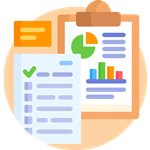 Economics is a multilayered field that delves deep into the intricate workings of our global financial systems, consumer behavior, and resource allocation. For students and scholars alike, the process of choosing the perfect economics research ideas can be a challenge. The choice of your research topic not only influences the direction of your academic journey but also determines the scope of your study. It's a decision that requires careful consideration and insight into current economic trends and issues. In the pursuit of writing a captivating economics topic, you may find yourself grappling with numerous questions: What are the most pressing economic issues of our time? Which areas of economics are ripe for exploration and innovation? How can you formulate a research question that is both relevant and thought-provoking? These questions can be overwhelming, but fear not, as help is at hand. We understand that the process of selecting the best economics research ideas can be challenging, and that's why we offer the best economics topic writing guidance to assist you in this crucial endeavor. Our team of experienced writers and researchers specializes in economics and can help you identify captivating research topics that not only align with your academic goals but also contribute to the broader discourse in the field. There is a range of topics and ideas, providing you with valuable insights and suggestions to kickstart your research journey. Whether you're a student embarking on a thesis or a seasoned economist seeking fresh perspectives, our goal is to facilitate your quest for the best topics.
Economics is a multilayered field that delves deep into the intricate workings of our global financial systems, consumer behavior, and resource allocation. For students and scholars alike, the process of choosing the perfect economics research ideas can be a challenge. The choice of your research topic not only influences the direction of your academic journey but also determines the scope of your study. It's a decision that requires careful consideration and insight into current economic trends and issues. In the pursuit of writing a captivating economics topic, you may find yourself grappling with numerous questions: What are the most pressing economic issues of our time? Which areas of economics are ripe for exploration and innovation? How can you formulate a research question that is both relevant and thought-provoking? These questions can be overwhelming, but fear not, as help is at hand. We understand that the process of selecting the best economics research ideas can be challenging, and that's why we offer the best economics topic writing guidance to assist you in this crucial endeavor. Our team of experienced writers and researchers specializes in economics and can help you identify captivating research topics that not only align with your academic goals but also contribute to the broader discourse in the field. There is a range of topics and ideas, providing you with valuable insights and suggestions to kickstart your research journey. Whether you're a student embarking on a thesis or a seasoned economist seeking fresh perspectives, our goal is to facilitate your quest for the best topics.
What are the five research methods in economics students can use?
Economics students have a variety of research methods at their disposal to investigate economic phenomena and answer research questions. Here are five commonly used research methods in economics:
- Empirical Analysis: This method involves collecting and analyzing real-world data to test economic theories and hypotheses. Students can use data from sources like surveys, government agencies, or economic databases to study topics such as inflation rates, consumer behavior, or labor markets.
- Experimental Research: Experimental economics involves designing controlled experiments to study economic behavior and decision-making. Students can create hypothetical scenarios and observe how individuals or groups make choices to understand economic concepts like game theory or market behavior.
- Case Studies: Case studies involve an in-depth examination of a specific economic situation, firm, or industry. Students can analyze historical or contemporary cases to gain insights into issues like market failures, business strategies, or policy impacts.
- Mathematical Modeling: Economic modeling uses mathematical equations and models to represent economic relationships and predict outcomes. Students can develop models to simulate economic scenarios, such as supply and demand dynamics, fiscal policies, or investment strategies.
- Literature Review: A literature review involves analyzing and synthesizing existing research and scholarly articles on a particular economic topic. Students can critically assess the findings of previous studies, identify gaps in the literature, and propose new research directions.
The impact of our experts’ skills on the quality of your economics topic
The quality of your economics topic is significantly influenced by the expertise of our team of experts. Our experts bring a wealth of knowledge and experience to the table, ensuring that your topic is thoroughly researched, well-informed, and presented in a clear and insightful manner. Their skills in data analysis, economic modeling, and understanding of economic theories and trends enable them to provide a comprehensive and nuanced perspective on the subject matter. We offer reliable economics research topics writing help. Furthermore, our experts’ ability to critically evaluate and synthesize information from various sources ensures that your economics topic is both credible and up-to-date. Whether it's conducting in-depth research, crafting compelling arguments, or offering practical policy recommendations, our experts play a pivotal role in elevating the quality of your economics topic, making it informative and impactful to both academic and practical audiences. Their dedication to excellence ensures that your topic stands out and contributes meaningfully to the field of economics.
What are the types of economics realized during research?
Economics is a complex field, and research within it encompasses various subdisciplines and approaches. Here are the prominent categories that researchers commonly explore:
- Macroeconomics: This branch focuses on the study of the economy as a whole, including topics like economic growth, inflation, unemployment, and fiscal and monetary policy. Macroeconomists analyze how government policies and external factors impact a nation's overall economic performance.
- Microeconomics: Microeconomics delves into the behavior of individual economic agents, such as consumers, firms, and markets. Researchers in this area examine supply and demand dynamics, pricing strategies, market structures, and consumer choices.
- Development Economics: This field concentrates on the economic development of nations and regions. Researchers investigate factors influencing economic growth, poverty alleviation, income inequality, and the impact of policies and interventions on improving living standards in less developed countries.
- Environmental Economics: As environmental concerns grow, economists study the intersection of economics and the environment. This research assesses the economic costs and benefits of environmental policies, resource management, and the implications of climate change mitigation.
- Behavioral Economics: Behavioral economists explore how psychology and human behavior influence economic decision-making. They investigate phenomena like irrationality, biases, and heuristics to better understand why people make certain economic choices.
 The realm of economics research is a dynamic and essential field that plays a pivotal role in shaping our understanding of the world's economic systems, policies, and trends. Economics research is many-sided, encompassing a wide range of subjects, from macroeconomics to microeconomics, international trade to behavioral economics, and many more. The process of selecting the right topic is crucial, as it sets the foundation for a successful and impactful study. Whether you are a student looking for your next research project or a seasoned economist seeking to contribute to the field, it is crucial to have a well-crafted research idea on economics. Moreover, seeking our assistance in this endeavor can be a game-changer. We can significantly enhance the quality and relevance of your research. As we continue to navigate the complexities of our global economy, innovative and well-informed research in economics is more important than ever. With a wealth of knowledge and expertise, we can further our understanding of economic phenomena and develop solutions to the complex challenges facing our world today. So, whether you're exploring environmental economics, financial markets, or any other subfield, remember that the right research topic, coupled with our guidance, can be the catalyst for meaningful contributions to the field of economics.
The realm of economics research is a dynamic and essential field that plays a pivotal role in shaping our understanding of the world's economic systems, policies, and trends. Economics research is many-sided, encompassing a wide range of subjects, from macroeconomics to microeconomics, international trade to behavioral economics, and many more. The process of selecting the right topic is crucial, as it sets the foundation for a successful and impactful study. Whether you are a student looking for your next research project or a seasoned economist seeking to contribute to the field, it is crucial to have a well-crafted research idea on economics. Moreover, seeking our assistance in this endeavor can be a game-changer. We can significantly enhance the quality and relevance of your research. As we continue to navigate the complexities of our global economy, innovative and well-informed research in economics is more important than ever. With a wealth of knowledge and expertise, we can further our understanding of economic phenomena and develop solutions to the complex challenges facing our world today. So, whether you're exploring environmental economics, financial markets, or any other subfield, remember that the right research topic, coupled with our guidance, can be the catalyst for meaningful contributions to the field of economics.
Professional Topic Ideas for Economics Students | Expert Guidance
 In the dynamics of economics, students often find themselves grappling with the challenge of selecting relevant topics for their academic pursuits. Whether you're an undergraduate delving into the intricacies of microeconomics or a graduate student exploring the macroeconomic landscapes, choosing the right topic is important yet challenging. This is where our expert finances topic selection guidance becomes invaluable. At the intersection of scholarly exploration and real-world implications, economics plays a pivotal role in shaping our global society. Therefore, the topics you choose to investigate can have far-reaching consequences, both academically and in practice. That's why we are here to offer reliable economics topic writing help. Our promise is to empower economics students with a diverse range of ideas that not only capture the essence of economic theory but also resonate with the contemporary challenges facing our world. Our team of experts, well-versed in the ever-evolving economic landscape, is dedicated to helping you navigate this intellectual journey. With a plethora of thought-provoking topics, from behavioral economics and environmental sustainability to international trade dynamics and the impact of economic policies on income inequality, you can create a good project. These topics will not only stimulate your academic curiosity but also equip you with the tools to engage in meaningful discussions and contribute to the field's ongoing discourse.
In the dynamics of economics, students often find themselves grappling with the challenge of selecting relevant topics for their academic pursuits. Whether you're an undergraduate delving into the intricacies of microeconomics or a graduate student exploring the macroeconomic landscapes, choosing the right topic is important yet challenging. This is where our expert finances topic selection guidance becomes invaluable. At the intersection of scholarly exploration and real-world implications, economics plays a pivotal role in shaping our global society. Therefore, the topics you choose to investigate can have far-reaching consequences, both academically and in practice. That's why we are here to offer reliable economics topic writing help. Our promise is to empower economics students with a diverse range of ideas that not only capture the essence of economic theory but also resonate with the contemporary challenges facing our world. Our team of experts, well-versed in the ever-evolving economic landscape, is dedicated to helping you navigate this intellectual journey. With a plethora of thought-provoking topics, from behavioral economics and environmental sustainability to international trade dynamics and the impact of economic policies on income inequality, you can create a good project. These topics will not only stimulate your academic curiosity but also equip you with the tools to engage in meaningful discussions and contribute to the field's ongoing discourse.
What are the specific topics for research in economics for students?
Students pursuing research in economics have a wide array of topics to explore, ranging from traditional macroeconomic and microeconomic subjects to emerging areas of interest. Here are some specific topics for research in economics:
- Behavioral Economics: Investigate how psychological factors influence economic decisions, such as consumer choices, savings, and investment.
- Environmental Economics: Examine the economic impacts of environmental policies, climate change, and sustainable resource management.
- Labor Economics: Study labor market trends, wage disparities, employment policies, and the gig economy's implications.
- Development Economics: Analyze economic growth, poverty alleviation, and the effectiveness of development aid in different regions.
- Health Economics: Explore healthcare systems, healthcare expenditure, and the economic consequences of public health issues, like pandemics.
- International Trade: Investigate trade policies, trade agreements, and their effects on economies and industries.
- Financial Economics: Study financial markets, asset pricing, and the behavior of financial institutions.
- Monetary Economics: Analyze the role of central banks, monetary policy, inflation, and currency exchange rates.
- Public Economics: Examine government spending, taxation, fiscal policies, and their impact on economic stability and equity.
- Industrial Organization: Explore market structures, competition, antitrust policies, and regulation in various industries.
- Economics of Innovation: Explore the role of innovation, technology adoption, and intellectual property in economic growth.
Why should students use the best economic research ideas?
Students should use the best ideas for several compelling reasons. Selecting a well-defined and relevant topic ensures that their efforts are directed toward addressing important issues within the field, increasing the potential impact of their work. Also, the topics often offer opportunities for innovation and original contributions to economic literature, fostering intellectual growth and personal development. Moreover, a strong research topic can enhance the chances of securing funding or academic recognition, facilitating career advancement and networking opportunities. Additionally, a good topic allows students to demonstrate their analytical and critical thinking skills, which are highly valued in both academia and the job market. Additionally, professional topic ideas for economics students can foster a deeper understanding of economic principles and real-world applications, ultimately enriching their academic experiences and empowering them to make informed decisions in an increasingly complex and interconnected global economy. Selecting the best ideas is paramount for academic and professional success, personal growth, and the advancement of economic knowledge.
Which economic research topics should students avoid?
Students should generally avoid economic research topics that are too narrow, outdated, or lack academic significance. Narrow topics may limit the availability of data and make it challenging to draw meaningful conclusions. Outdated topics may not contribute to the current state of economic knowledge and may not engage readers or instructors. Moreover, students should steer clear of topics that have been extensively studied unless they can offer a unique perspective or research question. Additionally, overly complex or technical subjects may be unsuitable unless the student has a strong grasp of the necessary mathematical and analytical tools. Controversial or sensitive topics should be approached with caution, as they may require a deep understanding of the subject matter and a balanced presentation of different viewpoints. In a nutshell, students should avoid topics that lack sufficient data or empirical evidence to support their research, as conducting meaningful economic analysis often depends on robust data sources. Ultimately, the choice of a research topic should align with the student's interests, skills, and the availability of relevant resources and data.
 The realm of economics offers a vast landscape of intriguing topics and areas of specialization for students to explore. The guidance provided by experts in the field can prove invaluable in shaping the academic and professional journey of economics students. Economics is not merely a theoretical discipline; it is a dynamic field with real-world implications. The professional economics research ideas discussed here, ranging from behavioral to environmental economics and fintech, reflect the evolving nature of the subject. Economics students can harness these ideas to deepen their understanding of economic phenomena and develop innovative solutions to contemporary challenges. The importance of interdisciplinary perspectives cannot be overstated. Collaborations with experts from fields such as sociology, psychology, and data science can open up exciting research opportunities and enrich the study of economics. As economics students venture into their careers, the knowledge and expertise gained from exploring these topics will equip them to address the complex economic issues facing society today. Whether pursuing academia, public policy, or private sector roles, economics students armed with a diverse skill set and a deep understanding of these topics will be better prepared to make meaningful contributions to their chosen field and, by extension, to the global community.
The realm of economics offers a vast landscape of intriguing topics and areas of specialization for students to explore. The guidance provided by experts in the field can prove invaluable in shaping the academic and professional journey of economics students. Economics is not merely a theoretical discipline; it is a dynamic field with real-world implications. The professional economics research ideas discussed here, ranging from behavioral to environmental economics and fintech, reflect the evolving nature of the subject. Economics students can harness these ideas to deepen their understanding of economic phenomena and develop innovative solutions to contemporary challenges. The importance of interdisciplinary perspectives cannot be overstated. Collaborations with experts from fields such as sociology, psychology, and data science can open up exciting research opportunities and enrich the study of economics. As economics students venture into their careers, the knowledge and expertise gained from exploring these topics will equip them to address the complex economic issues facing society today. Whether pursuing academia, public policy, or private sector roles, economics students armed with a diverse skill set and a deep understanding of these topics will be better prepared to make meaningful contributions to their chosen field and, by extension, to the global community.













